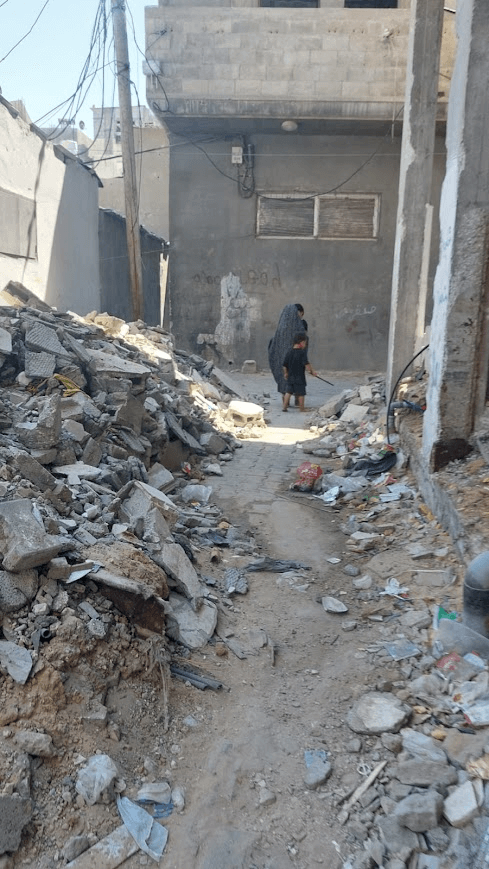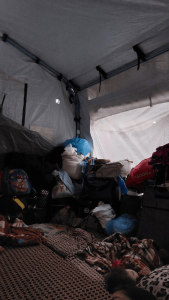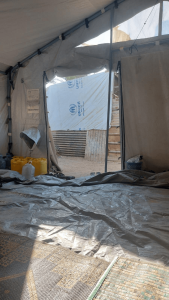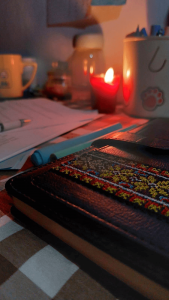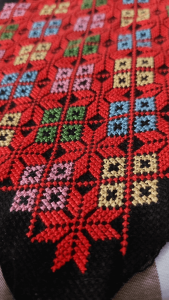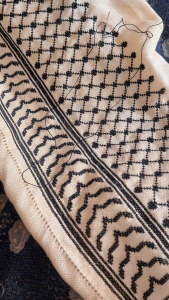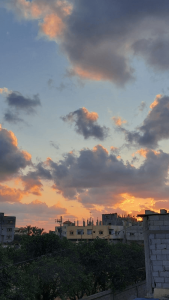By Shahd Ahmad Alnaami
I am Shahd Ahmad Alnaami. I’m an English literature and translation student at the Islamic University of Gaza, currently living amidst the hardships of the genocide. As a writer, I strive to convey the stories of my people in a unique way, and I am also a writer with We Are Not Numbers.
Growing up in Gaza, I have suffered from many wars since 2008, 2012, 2014, and 2022, but this war is the worst. My grandmother is a survivor of the Nakba (Catastrophe); she tells us that this war is worse than the Nakba; it’s a genocide. However, I am still holding on to hope of being alive and enjoying peace one day in my country. I am a refugee in Gaza, originally from Beersheba, a Palestinian city taken by the Israeli occupation, which displaced my grandparents. Gaza embraced all of us. It was a shelter and home for the homeless. Gaza was our only choice, and it was the best. My grandmother always tells us about our Palestinian cities. Even though we didn’t visit any of them, we have experienced them in our minds through her stories. I have never been out of Gaza before, yet I carry the whole world in my heart. Even if the world does not welcome us as Palestinians, we are still trying to be, to exist. In my first year as an English literature student, the first thing we learned was Shakespeare’s quote, “To be or not to be, this is the question.” It resonated with me deeply because of how much it expresses the Palestinian struggle to remain in our land. I will never stop fighting with my voice and words to get our land back.
This street is near where I live. It used to be crowded, and I always walked on it. Today, it’s destroyed, full of rubble.
Gaza taught me the true meaning of love, hope, beauty, resilience, and strength. It showed me how to persevere and, even if I faltered, how to rise and start again. From Gaza, I learned how to give and forgive, how to love and live. Through its heart, I saw the beauty in the world. Yet, the occupation has never allowed Gaza to simply exist. They have destroyed it, robbing us of so much—our freedom to travel, consistent electricity (sometimes limited to just six hours a day), and now even our right to live. Still, we found happiness in the little we had. After every aggression, we would shake off the dust, rebuild what was destroyed, and reclaim our spirit once again.
This time, everything we had was destroyed—nothing was left for us. They demolished schools, universities, hospitals, mosques, churches, homes, and even the infrastructure. They didn’t just destroy buildings; they shattered parts of our lives. They killed my people—members of my family and my friends. They forced me to move from place to place five times. For three months, I lived in a tent—a hardship like no other. Living in a tent is one of the hardest experiences anyone can endure. At night, while lying down, you hear the sound of bombs echoing all around you. The thin fabric of the tent offers no protection from the cold nights or the scorching heat of the day. Sleep becomes impossible, haunted by the fear of a missile striking the area, burning all the tents—including you. The thought of being killed, burned, or left unburied lingers in your mind. These visions haunt you every night. For everyone living in a tent, every night is a nightmare.
This photo was taken in the tent after we put in our few belongings and my little cousin was sleeping.
This photo captures my first moments in the tent.
This is my destroyed home. I’m holding the key to it along with the Palestinian flag.
Despite all these dark times, I never lost hope. I always believed that every phase, no matter how difficult, would eventually end. Every morning, I reminded myself: This too shall pass. Even now, I am certain that this war will end one day, and we will rebuild Gaza once again, as we always do. Even if it takes years, we will rebuild it. Nothing bad lasts forever. That’s why, every morning, I wake up grateful to be alive and pray for the safety and peace of my people. I’ve come to see each new day as a gift from God, one that we must cherish and use wisely. I’ve learned to be kind to myself because the world is already harsh enough. If we aren’t the ones who celebrate our small achievements, who will? If we don’t become our own best friends, who else will? Our souls are gifts, and we owe it to ourselves to nurture them with love and care. I’ve also learned that many things in life don’t deserve our sadness or the energy we waste worrying about them. Hard times will come, but we can live through them, feel them, and eventually move past them. Our time on this planet is short, too short to spend it weighed down by sadness. As long as we are alive, things will continue to change. We won’t stay in the same place forever, and neither will our circumstances. This is the source of hope: nothing remains the same—not our struggles, nor us.
My desk, with my favorite embroidered notebook and a candle lighting the space for writing.
I grappled with the loss of my best friend, Eman, who was killed during the war. In an attempt to cope with the pain, I reread all the books she had borrowed from me, feeling her presence in their pages. This journey of remembrance led me to write about her life, and unexpectedly, writing became a source of healing for me. Encouraged by friends, I shared her story. It resonated deeply with readers, leaving a lasting impact. Through this process, I discovered that the best way to accept the loss of someone or something dear is to carry their memories with us wherever we go, to speak about them, and to keep them alive in our hearts.
I learned the precision and patience required for Tatreez from my grandmother, who often reminded me, “What is built on a mistake is a mistake.” In embroidery, if you make an error, you cannot continue without correcting it. This principle reflects the injustices faced by my community—we believe that systems built on oppression will eventually collapse. The colors in embroidery choose themselves and flow naturally in the design, just as Gaza has chosen its people to be a part of it. It is as if no one in this world can live in Gaza and love it the way we do. Watching my grandmother embroider always brought me joy. Through her craft, she taught us the meaning of resilience and how to face each day with strength. She also showed me how to spread positive energy wherever I go and how to love everything in life.
This is the first piece of embroidery I made after my grandmother taught me.
This is a keffiyeh that my grandmother was embroidering.
This is a Gaza sunset from my grandmother’s house.
My parents, too, have always been by my side. They never stopped encouraging me, teaching me to be a giver and to respond to anyone in need. That’s why I always tell my friends, “I am here for you.” I believe in standing by each other and spreading love and hope. I still hold onto the belief that after every sunset, there will be a sunrise. My life is not perfect, but I have chosen to paint it with hope. Even if Gaza feels gray now, we will paint it bright again. I just want to live.

